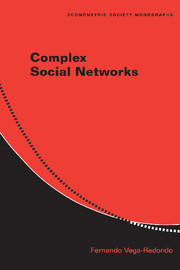Book contents
- Frontmatter
- Contents
- Preface
- 1 Introduction
- 2 Complex Networks: Basic Theory
- 3 Epidemic Diffusion
- 4 Neighborhood Effects in Diffusion and Play
- 5 Searching in Social Networks
- 6 Search, Diffusion, and Play in Coevolving Networks
- Afterword
- A Generating Functions
- B The Ising Model
- C Mean-Field Theory
- Bibliography
- Index
- Econometric Society Monographs
C - Mean-Field Theory
Published online by Cambridge University Press: 05 January 2013
- Frontmatter
- Contents
- Preface
- 1 Introduction
- 2 Complex Networks: Basic Theory
- 3 Epidemic Diffusion
- 4 Neighborhood Effects in Diffusion and Play
- 5 Searching in Social Networks
- 6 Search, Diffusion, and Play in Coevolving Networks
- Afterword
- A Generating Functions
- B The Ising Model
- C Mean-Field Theory
- Bibliography
- Index
- Econometric Society Monographs
Summary
Mean-field theory has been one of the main approaches traditionally used in the study of phase transitions of physical systems. It dates back to the early 20th century, when it was first applied by Pierre Weiss and others to the analysis of the phenomenon of ferromagnetism. (See, for example, the classical monograph by H. E. Stanley (1971) [264] for a historical account of these developments and an introduction to the field of phase transitions.)
Mean-field theory is usually applied to the analysis of complex systems where the interaction among a large number of individual “particles” proceeds along many dimensions. Under these conditions, the intuitive idea underlying the approach can be simply explained as follows. If the nature of interaction is rich (i.e. highly dimensional), it should be possible to capture the overall behavior of the system through a stylized model of the situation in which the host of effects impinging on each individual entity is replaced by a suitable mean field. In such a mean-field approach, the average description of the system is tailored to a suitable aggregate (or average) of the large number of individual effects exerted by the population at large. The self-referential nature of the exercise is thus apparent: the average state of the system is both an explanatory variable and the variable itself to be explained. This suggests that, in many cases, mean field theory must seek a self-consistent solution. This is why it is also often labeled self-consistent field theory.
- Type
- Chapter
- Information
- Complex Social Networks , pp. 268 - 274Publisher: Cambridge University PressPrint publication year: 2007



